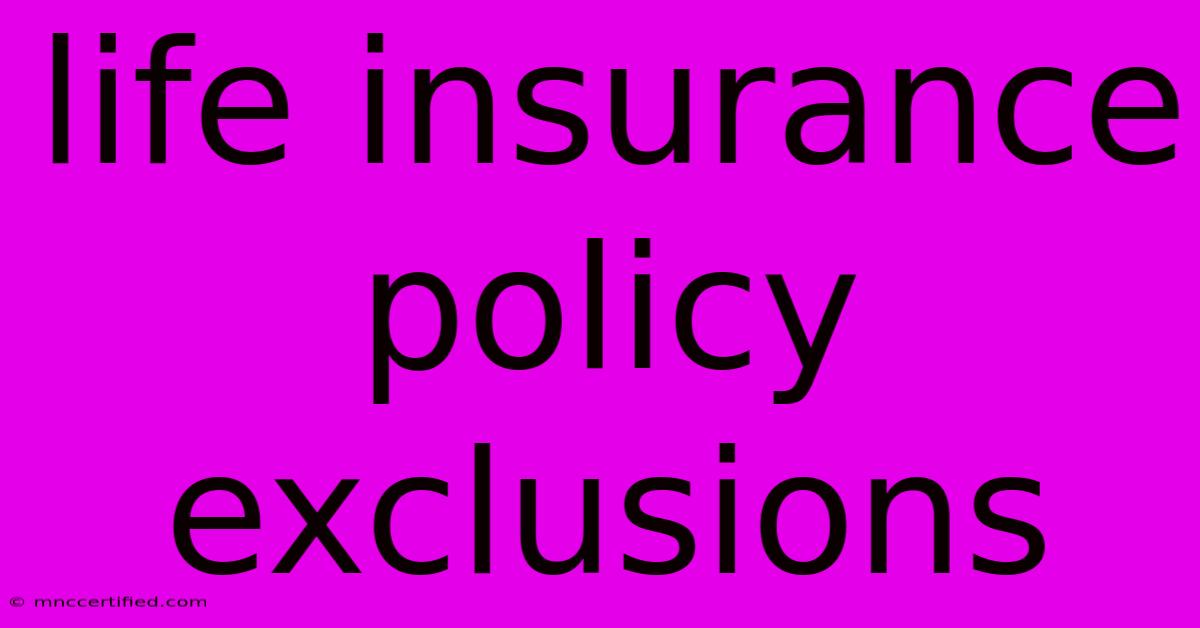Life Insurance Policy Exclusions

Table of Contents
Life Insurance Policy Exclusions: What You Need to Know
Life insurance provides a crucial financial safety net for your loved ones. However, it's not a blanket guarantee. Understanding the life insurance policy exclusions is vital before purchasing a policy to avoid unpleasant surprises later. This comprehensive guide will delve into the common exclusions, helping you make an informed decision.
Common Exclusions in Life Insurance Policies
Life insurance policies, while designed to protect beneficiaries, typically exclude coverage under specific circumstances. These exclusions are often detailed in the policy document's fine print, so careful review is paramount. Here are some of the most prevalent exclusions:
1. Death by Suicide
Many policies exclude coverage if the insured dies by suicide within a specified period, usually one or two years, from the policy's effective date. This waiting period allows the insurer to assess the applicant's mental state and mitigate against potential fraud. The exact timeframe varies depending on the insurer and policy type. Always check your policy document for the specific suicide exclusion clause.
2. Death Due to Illegal Activities
Participating in illegal activities, such as drug trafficking or committing a felony, can lead to a denial of benefits. If your death results from an illegal act you were directly involved in, your beneficiaries might not receive the payout. This exclusion underscores the importance of honesty and transparency during the application process.
3. Death Caused by Pre-Existing Conditions (Sometimes)
While most life insurance policies cover death from illness, some pre-existing conditions might be excluded or require additional riders and increased premiums. These pre-existing conditions might be explicitly listed in your policy or subject to the insurer's underwriting process. Disclosure is key: Failing to disclose pre-existing health conditions can void your policy.
4. Death Resulting from Hazardous Activities
Certain high-risk activities, like skydiving, mountaineering, or professional racing, may be excluded or require additional premiums. These exclusions protect the insurer from undue risk. If you engage in such activities, you should discuss them with your agent to find out if they impact your coverage or require supplementary riders.
5. War or Military Service
Policies often exclude coverage for death caused by war or active military service, particularly in combat zones. The specific terms can vary depending on the policy and insurer. This exclusion is common due to the inherent high-risk nature of these situations.
6. Travel to High-Risk Areas
Similar to military service exclusions, some policies may exclude or restrict coverage for deaths occurring in designated high-risk areas, often affected by political instability or natural disasters. Check your policy's specific geographical limitations.
Understanding Riders and Add-ons
While exclusions limit coverage, riders can often extend it. These are optional additions to your policy that can modify or enhance coverage. For instance, you may be able to purchase a rider that covers certain hazardous activities or extends coverage for pre-existing conditions. Always discuss available riders with your insurance agent to tailor your policy to your specific needs and risk profile.
The Importance of Transparency and Disclosure
Honesty is paramount when applying for life insurance. Providing accurate information about your health, lifestyle, and activities is crucial. Failing to disclose relevant information can lead to policy rejection or denial of benefits if a claim arises.
Review Your Policy Regularly
Life circumstances change, and so should your insurance needs. Regularly reviewing your life insurance policy and ensuring it still aligns with your goals is essential. This review should include a check of your beneficiaries and any potential impact of life changes on your existing coverage.
Consult with a Professional
Navigating the complexities of life insurance can be challenging. Consulting with a qualified insurance broker or financial advisor can help you choose the most suitable policy and understand its terms and conditions, including its exclusions. Their expertise ensures you have the right coverage for your specific circumstances.
By understanding these common exclusions and actively engaging with your insurance provider, you can ensure that your life insurance policy effectively protects your loved ones' future. Remember, proactive understanding is the best defense against unexpected consequences.

Thank you for visiting our website wich cover about Life Insurance Policy Exclusions. We hope the information provided has been useful to you. Feel free to contact us if you have any questions or need further assistance. See you next time and dont miss to bookmark.
Featured Posts
-
Sales Atlanta Cy Young Win Celebrated
Nov 22, 2024
-
Best Nfl Cards To Invest In 2023
Nov 22, 2024
-
Global Response To Netanyahu Gallant Icc Arrest
Nov 22, 2024
-
Russias New Irbm Targets Ukraine
Nov 22, 2024
-
Real Estate Investing In Florida
Nov 22, 2024